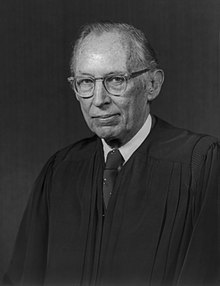Lewis F. Powell Jr. | |
|---|---|
 Official portrait, 1976 | |
| Associate Justice of the Supreme Court of the United States | |
| In office January 7, 1972 – June 26, 1987[1] | |
| Nominated by | Richard Nixon |
| Preceded by | Hugo Black |
| Succeeded by | Anthony Kennedy |
| Chairman of Virginia State Board of Education | |
| In office 1968–1969 | |
| 88th President of American Bar Association | |
| In office 1964–1965 | |
| Preceded by | Walter Early Craig |
| Succeeded by | Edward W. Kuhn |
| Chairman of Richmond School Board | |
| In office 1952–1961 | |
| Personal details | |
| Born | Lewis Franklin Powell Jr. September 19, 1907 Suffolk, Virginia, U.S. |
| Died | August 25, 1998 (aged 90) Richmond, Virginia, U.S. |
| Resting place | Hollywood Cemetery |
| Political party | Democratic[2] |
| Spouse |
Josephine Pierce Rucker
(m. 1936; died 1996) |
| Children | 4 |
| Education | |
| Military service | |
| Allegiance | |
| Branch/service | United States Army |
| Years of service | 1942–1945 |
| Rank | |
| Battles/wars | World War II |
| Awards | Bronze Star Legion of Merit Croix de Guerre |
Lewis Franklin Powell Jr. (September 19, 1907 – August 25, 1998) was an American lawyer and jurist who served as an associate justice of the Supreme Court of the United States from 1972 to 1987.
Born in Suffolk, Virginia, he graduated from both the Washington and Lee University School of Law and Harvard Law School and served in the United States Army Air Forces during World War II. He worked for Hunton & Williams, a large law firm in Richmond, Virginia, focusing on corporate law and representing clients such as the Tobacco Institute. His 1971 Powell Memorandum became the blueprint for the rise of the American conservative movement and the formation of a network of influential right-wing think tanks and lobbying organizations, such as The Heritage Foundation and the American Legislative Exchange Council. In 1971, President Richard Nixon appointed Powell to succeed the late Associate Justice Hugo Black. He retired from the Court during the administration of President Ronald Reagan, and was eventually succeeded by Anthony Kennedy.
His tenure largely overlapped with that of Chief Justice Warren Burger, and Powell was often a key swing vote on the Burger Court. His majority opinions include United States v. Brignoni-Ponce (1975), Gregg v. Georgia (1976), First National Bank of Boston v. Bellotti (1978), Solem v. Helm (1983), and McCleskey v. Kemp (1987), and he wrote an influential opinion in Regents of the University of California v. Bakke (1978). He notably joined the majority in controversial cases such as United States v. United States District Court (1972), Roe v. Wade (1973), Milliken v. Bradley (1974), Harris v. McRae (1980), Plyler v. Doe (1982), and Bowers v. Hardwick (1986).
- ^ "Members of the Supreme Court of the United States". Supreme Court of the United States. Archived from the original on April 29, 2010. Retrieved April 26, 2010.
- ^ Biskupic, Joan; Barbash, Fred (August 26, 1998). "Retired Justice Lewis Powell Dies at 90". The Washington Post. Archived from the original on January 12, 2021. Retrieved September 3, 2017.